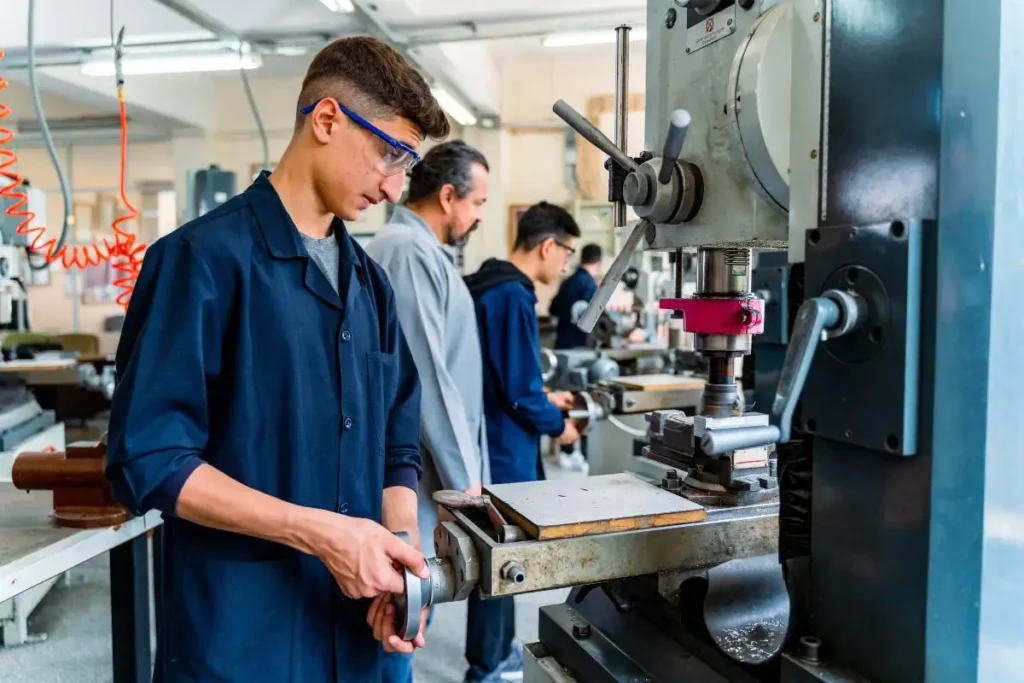Vocational rehabilitation (VR) plays a crucial role in helping individuals with Autism Spectrum Disorder (ASD) achieve successful employment outcomes. It provides tailored support to address unique challenges faced by those on the spectrum.
Defining Vocational Rehabilitation
Vocational rehabilitation refers to a set of services designed to help individuals with disabilities prepare for, secure, maintain, or regain employment. These services can include assessments, job training, skills development, and job placement assistance.
Specifically for individuals with autism, VR focuses on identifying their strengths and interests, which can guide their career paths. Collaborating with various stakeholders, including educators, employers, and therapists, ensures that the support provided is comprehensive and effective.
Relevance to Autism Spectrum Disorder
Individuals with ASD often encounter specific challenges in the workplace, such as communication difficulties and social interaction issues. Vocational rehabilitation specialists are trained to address these needs, providing strategies to enhance job performance and interpersonal skills.
They can implement tailored approaches, such as social skills training and job coaching, to help individuals navigate workplace dynamics. By fostering an inclusive environment, VR not only aids individuals in finding suitable employment but also helps employers understand and support their unique workforce needs.
Roles of Vocational Rehabilitation Specialists
Vocational rehabilitation specialists play a crucial role in supporting individuals with autism. They provide tailored assistance through structured processes that enhance employment opportunities and personal development.
Assessment and Planning
Assessment is a pivotal initial step. Specialists conduct comprehensive evaluations to understand an individual’s skills, interests, and challenges. This process often includes standardized tests and interviews.
Based on these assessments, they create personalized rehabilitation plans. These plans outline clear goals, necessary resources, and timelines for achieving employment.
The specialists collaborate with clients to ensure the plan aligns with their aspirations. This partnership fosters a sense of ownership in the rehabilitation process.
Support and Counseling
Support extends beyond assessments. Specialists provide ongoing counseling to help individuals navigate various challenges during their job search and workplace integration.
They help clients develop effective coping strategies to manage anxiety and enhance communication skills, which are vital in a work environment. Regular check-ins help monitor progress and adapt strategies as needed.
Furthermore, they serve as advocates, helping clients articulate their needs to potential employers. This advocacy can lead to job adjustments that accommodate specific challenges associated with autism.
Training and Skill Development
Training is essential for ensuring clients are job-ready. Vocational rehabilitation specialists design targeted training programs that focus on both soft and hard skills, including teamwork and technical abilities.
Workshops and hands-on training sessions equip individuals with the competencies required for specific roles. They may also facilitate internships to provide real-world experience.
Skill development is an ongoing process. Specialists encourage continuous learning and adaptation to new tasks, which helps individuals maintain long-term employment success.
Services Offered in Vocational Rehabilitation
Vocational rehabilitation specialists provide a range of services tailored to support individuals with autism in achieving their career goals. These services aim to enhance job readiness, facilitate successful employment, and promote job retention.
Job Placement Assistance
Job placement assistance involves matching individuals with suitable job opportunities based on their skills, interests, and needs. Specialists conduct assessments to determine the best employment fit, considering both the individual’s abilities and the specific requirements of potential employers.
Specialists often maintain relationships with local businesses to understand their hiring needs. They guide effective job search strategies, interview preparation, and resume writing. This personalized support helps individuals navigate the often daunting job market.
Workplace Accommodation
Workplace accommodation is essential for ensuring that individuals with autism can perform their tasks effectively. Vocational rehabilitation specialists work closely with employers to identify necessary adjustments in the workplace.
These adjustments may include modified workstations, flexible scheduling, or changes in communication methods. Specialists also educate employers about autism and its impact on work performance. This understanding fosters a more inclusive environment and facilitates smoother transitions into the workforce.
Ongoing Support and Job Coaching
Ongoing support and job coaching are critical for promoting long-term success in the workplace. After placement, vocational rehabilitation specialists provide continuous guidance and support to help individuals navigate challenges.
Job coaches often accompany individuals during initial workdays to provide on-the-job training and encouragement. They help in developing workplace skills, such as communication, time management, and problem-solving. This ongoing relationship ensures that individuals remain engaged and supported as they adjust to their new roles.
Integrating Vocational Rehabilitation with Other Support Services
Effective integration of vocational rehabilitation with other support services enhances the overall support available for individuals with autism. Collaboration, open communication, and tailored approaches can make a significant difference in outcomes.
Collaboration with Educators
Vocational rehabilitation specialists work closely with educators to ensure that students with autism receive comprehensive support tailored to their needs. This collaboration helps identify each student’s strengths and challenges early on.
Educators provide insights on academic performance and social skills, helping specialists tailor vocational goals. Regular meetings between rehabilitation specialists and teachers facilitate the sharing of strategies and resources, leading to a more cohesive support system.
Involving educators in transition planning can enhance alignment between educational objectives and vocational goals. This teamwork fosters a smoother transition from school to work, where students feel more prepared and confident.
Working with Families and Caregivers
Families and caregivers play a crucial role in the vocational rehabilitation process. Specialists engage with them to gather vital information about the individual’s preferences, skills, and challenges.
By involving families, specialists can create more effective and personalized rehabilitation plans. Regular communication and feedback help families feel valued and empowered in their roles.
Support services may offer training sessions for families, equipping them with tools to assist their loved ones. This partnership creates a united front that helps individuals with autism navigate the complexities of the job market more effectively.
Liaising with Employers and Community Programs
Building relationships with local employers and community programs expands job opportunities for individuals with autism. Vocational rehabilitation specialists act as intermediaries, ensuring that employers understand the unique strengths of workers with autism.
By facilitating job placements, specialists help create supportive work environments. This may include educating employers about autism and its impact on communication and social interactions.
Connecting individuals to community programs offers valuable resources like job training and internship opportunities. These connections foster a network of support that encourages employer partnerships and enhances employment outcomes.
Challenges and Considerations in Vocational Rehabilitation
Vocational rehabilitation for individuals with autism presents unique challenges that require thoughtful strategies. These include addressing individual needs, overcoming workplace stigmas, and ensuring long-term employment sustainability.
Addressing Individual Needs
Every person with autism has distinct strengths and challenges. Vocational rehabilitation specialists must conduct thorough assessments to identify these individual needs. Personalized approaches can enhance skills related to communication, social interactions, and job performance.
Tailored support plans may include:
- Skill-building workshops: Focus on specific job-related skills.
- Job coaching: Provide guidance and support in real work environments.
- Sensory-friendly workspaces: Create environments that accommodate sensory sensitivities.
By recognizing and addressing personal requirements, specialists can better support each individual’s journey toward employment success.
Overcoming Workplace Stigmas
Stigmas surrounding autism can impact hiring and workplace dynamics. Employers may hold misconceptions about the capabilities of individuals on the spectrum. This can lead to reluctance in hiring or failure to provide adequate accommodations.
Vocational rehabilitation specialists must advocate for:
- Awareness training: Educate employers and co-workers on autism.
- Access to resources: Provide tools for inclusivity in the workplace.
- Success stories: Share examples of successful employees with autism.
Challenging these perceptions is critical to creating an accepting and supportive work environment for individuals with autism.
Ensuring Sustainable Employment
Achieving sustainable employment involves more than just securing a job. It requires ongoing support and strategies to maintain job satisfaction and performance. Specialists should implement regular follow-ups and assessments to ensure continued success.
Effective strategies may include:
- Mentoring programs: Pair individuals with experienced colleagues.
- Adjustment coaching: Assist with adapting to workplace changes.
- Career development pathways: Provide opportunities for growth and advancement.
By focusing on sustainability, vocational rehabilitation specialists can create a foundation that fosters long-term career success for individuals with autism.
Evaluating the Success of Vocational Rehabilitation Programs
Assessing how effective vocational rehabilitation programs are involves looking at various metrics. These metrics include job retention rates, improvements in quality of life, and ongoing feedback for program enhancements.
Measuring Job Retention Rates
Job retention rates serve as a primary indicator of the effectiveness of vocational rehabilitation programs. Higher retention rates suggest that individuals with autism are successfully integrating into the workforce.
To measure this, organizations track how long participants remain employed after completing their programs. Regular follow-ups and surveys can provide valuable data. It’s also helpful to differentiate between full-time and part-time employment, as these can have different implications for job stability.
Data Points to Consider:
- Time Frame: Tracking retention over six months, one year, or longer.
- Employment Type: Full-time versus part-time.
- Industry Stability: Some industries have higher turnover than others.
Improving Quality of Life Through Employment
Employment can substantially enhance the quality of life for individuals with autism. Programs aim to provide skills and opportunities that lead to not only job placement but also personal satisfaction.
Measuring success in quality of life can include assessing social interactions, independence, and financial stability. Feedback from participants can reveal changes in self-esteem and community engagement.
Indicators of Improvement:
- Social Skills Development: Are participants forming friendships or networking?
- Life Skills Acquisition: Do they feel more independent?
- Economic Benefits: Has there been a noticeable increase in disposable income?
Feedback and Continuous Improvement
Gathering ongoing feedback is crucial for program development. Regular input from participants can highlight what’s working and what needs adjustment.
Surveys, focus groups, and interviews with participants can uncover their experiences and suggestions for improvement. By analyzing this data, programs can continuously refine their approaches.
Effective Feedback Mechanisms:
- Surveys: Quick and easy, reaching many individuals.
- Focus Groups: Allow for a deeper discussion of experiences.
- Individual Interviews: Offer personal insights that surveys may miss.
These measures can help ensure that vocational rehabilitation programs remain relevant and responsive to the needs of participants.








